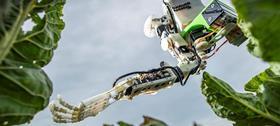
A “ground-breaking” new robot arm designed to pick brassicas is being developed by scientists at University of Plymouth.
The Automatic Brassica harvesting project in Cornwall, nicknamed ABC, aims to bring the machine to market in 'two to three' years, with the ability to harvest cauliflowers, broccoli, kale and cabbage, which are widely grown in the region.
Working alongside producers, the team is being led by lecturer in robotics Dr Martin Stoelen, with key agricultural expertise provided by professor of plant physiology Mick Fuller.
It has secured funding from Agri-Tech Cornwall, a three-year, £10million initiative part-funded by the European Regional Development Fund, with match-funding from Cornwall Council.
“Manual harvesting represents a large portion of producers’ total costs, often it can be up to 50 per cent, so looking at addressing that – especially against a backdrop of Brexit – is very important,” he said.
“We’d like to prove that robotic technology that can work in rural environments is not only possible, but affordable, viable and can help increase productivity on farms.
“There will always be jobs for people associated with agriculture – but it might be that in a decade’s time, instead of spending hours in the cab of a tractor, your role is managing and maintaining robots such as these.”
The design will integrate cameras and sensors into the hand that can make real-time 3D models of the crop by assessing the information it assimilates, allowing it to recognise what to collect and what to leave.
With the robot recording images and touch-data from all over a field in real time, it also offers huge data gathering potential from the field.
Dr Stoelen added: “Ultimately, machines such as this will make life easier and simpler as a farmer, but it’s also cool technology which might encourage more young people to choose a career in agriculture. There are a lot of small producers here in Cornwall and they shouldn’t be excluded from taking advantage of technology because it has the power to transform their lives, just as it can for larger producers.'






No comments yet